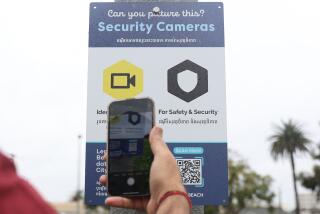State campaign finance data should be downloadable
California Secretary of State Debra Bowen is resisting a push by activists and journalists for better disclosure of campaign finance data, arguing in essence that it would cost too much to comply. It’s a surprising stance from Bowen, whose office has fought to make more information about donors available to California voters. It also strains credulity.
At issue is a request by MapLight California, California Common Cause and 10 others, including this newspaper, for a downloadable version of the campaign finance data that the secretary of state collects. The raw data are available today on CD-ROM for a small fee, and a slightly redacted version can be viewed for free on the department’s website. The discs aren’t available in a timely fashion outside of Sacramento, however, and the site’s formatting is cumbersome and limiting.
The tussle is important because the data represent voters’ main line of defense against the corrosive influence of special interests.
The high cost of running for state office in California gives well-heeled individuals and groups -- for example, organized labor, business groups and ideological nonprofits with wealthy (and anonymous) benefactors -- a disproportionately loud voice in campaigns. Lawmakers who try to lower the volume of special-interest money and ads risk running afoul of Supreme Court rulings that make it hard to limit election-related spending.
Instead, candidates and watchdog organizations such as MapLight try to curtail the power of special interests by exposing how much they’re pouring into campaigns. California voters tend to sour on candidates and ballot measures when told that their funding comes largely from a single industry, union or ideological faction. For proof, look at what happened to the seemingly consumer-friendly auto insurance measures in 2010 and 2012 that were backed largely by Mercury Insurance and its chairman, George Joseph.
Sadly, loopholes in state disclosure requirements enable some interests to keep their roles hidden behind nonprofit front groups. And those whose identities aren’t hidden can still count on the secretary of state’s Cal-Access website to make their contributions and expenditures harder to find than they should be.
State law requires candidates, political action committees and those making independent campaign expenditures to file numerous financial reports to the secretary of state’s elections division, including daily disclosures of big contributions and independent expenditures as an election nears. The reports come in electronically and are posted on Cal-Access right away.
The problem is that the site doesn’t let users sort or display the data coherently. For example, you can’t type “California Chamber of Commerce” or “California Teachers Association” into the site’s search box and display all the contributions or expenditures that group has reported. Instead, the site provides a list of links to a number of campaign committees whose reports you’d have to browse through to find what you’re looking for.
In short, the way the information is presented makes it hard to discern just how much the most active special interests are raising and spending to influence the outcome of California elections. That’s not the only shortcoming, however. Because the data can’t be downloaded, they can’t be correlated against other relevant information -- for example, lobbying records and votes cast in the Legislature.
As much as they’d like to see the Cal-Access site overhauled, MapLight and its allies asked simply that Bowen’s office upload a copy of the data each day to a site where the information would be available for downloading. “This change would vastly improve the public accessibility of valuable civic information, reaffirming California’s role as a leader in open government, and showing your commitment to shining a light on money in politics,” the groups wrote last month. “Moreover, it would save precious state funds, as your office would no longer have to support the staff necessary to process public records requests for copies of the database. Lastly, making this information available online on a daily basis would ensure voters, private organizations, and members of the media would have the state’s most recent data to use for independent analysis as well as spur online development and innovation.”
In her response last week, Bowen noted that the raw data collected by her office include information about a donor’s street address and bank account that state law doesn’t allow to be posted online. That’s not an issue for the CD-ROMs, but it would be for a downloadable compilation of the day’s filings, Bowen said.
“While the 14-year-old Cal-Access system can do many things,” Bowen wrote, “it does not contain a design component that redacts, blocks or filters this information from the data you would like to see posted on the Internet. It is not clear to me that creating such a ‘filter’ is cost-effective when designing, developing and deploying it would divert limited information technology resources from other high-priority responsibilities.”
Those high priorities, spokeswoman Shannan Velayas said, are a statewide voter registration database and a paperless system for business filings.
Daniel G. Newman, president and co-founder of MapLight, contended that it would take just a “simple computer program” to remove the address and banking information from the campaign finance data. The office is already generating the data in a format that’s easy to edit with a spreadsheet application such as Excel, so it’s not clear why Bowen sees such a huge technical hurdle to be overcome.
To her credit, Bowen has invited MapLight to meet with staffers this week to discuss the issue. Here’s hoping that MapLight can show the elections division a simple way to redact data so that the information can be made available for downloading, and that Bowen will implement it.
ALSO:
Endorsement: Eric Garcetti for mayor
Vicente Fox to Congress: Rethink that wall
Jason Collins is gay: What his announcement means
Follow Jon Healey on Twitter @jcahealey
More to Read
A cure for the common opinion
Get thought-provoking perspectives with our weekly newsletter.
You may occasionally receive promotional content from the Los Angeles Times.











